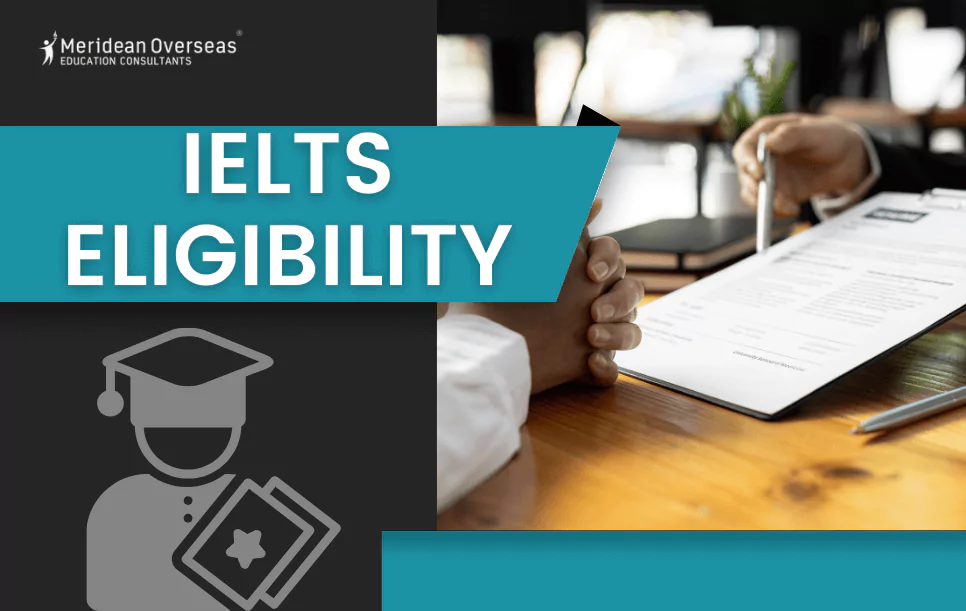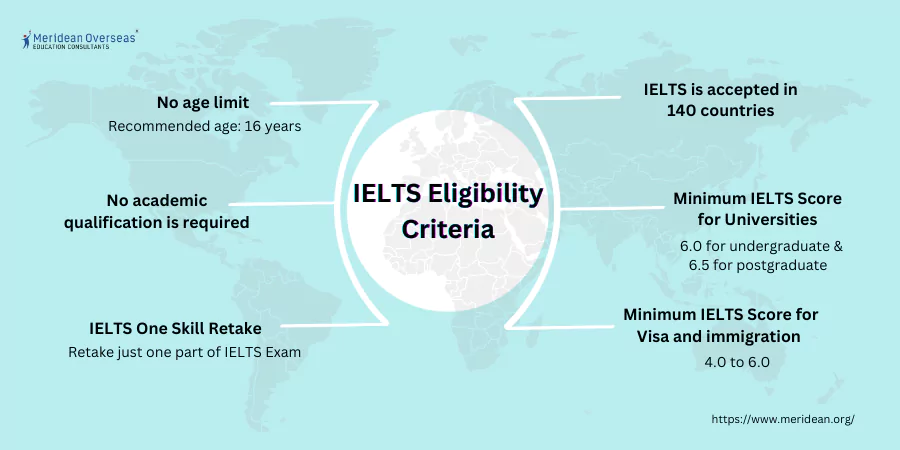
Announcements

Announcements

Do you want to unravel IELTS eligibility? IDP, the conducting body of IELTS, has not specified any eligibility criteria. But there are some considerations you must check before applying for the exam.
The IELTS exam is an English language proficiency test for those aiming to study, work, or immigrate to the host country. When your host country’s primary language is English, you must have a good knowledge of the language to communicate with others effectively. Here, you will get a comprehensive breakdown of IELTS eligibility criteria.

IELTS Eligibility Criteria
IELTS Exam Age Limit
IELTS Exam Eligibility for Top Universities 2025
IELTS Eligible Countries
FAQs
The IELTS exam serves two purposes, depending on your goals. One is IELTS Academic, tailored to your intention to study abroad and the other General Training version is designed for those planning to migrate or work in another country.

The IELTS eligibility criteria remain consistent despite the difference in the test types. Whether opting for Academic or General Training, you must meet the same set of requirements, ensuring a standardised assessment process for language proficiency.
IDP doesn't set strict qualifications which assess English skills regardless of education or age. An intermediate English proficiency level is necessary. However, universities may have specific score requirements for admission or employment, so check with them for additional criteria
|
IELTS Eligibility Criteria |
Not Specific |
|
Minimum Age |
Even though there is no set age limit, however, it is not recommended for students below 16 years |
|
Passport |
Valid, non-expired passport |
|
Use |
1. Planning to immigrate to Australia/Canada/New Zealand/UK. 2. Want to study in Australia/Canada/New Zealand/USA/UK and other countries. 3. Medical professionals who plan to study or work further in Australia/UK/USA. |
|
Minimum IELTS Score for Top Universities |
The minimum score varies from one university to another |
The world’s top universities have a set of requirements and guidelines, yet they vary from university to university. In addition to the eligibility criteria of top universities, you must fulfil all the requirements that your desired institution mentions.
Furthermore, you should also match other eligibility requirements aside from English proficiency set by your desired university.
Here in this section, we will walk you through IELTS eligibility across popular study-abroad destinations. So, let’s start unveiling IELTS-eligible countries.
The USA universities generally accept students with IELTS scores ranging from band 6.0 to 6.5. You must target your score higher than normally accepted. So, when you are applying to top-notch universities in the USA, you are required to target a much higher-than-average band score.
Now, let’s start unveiling IELTS eligibility in Canada. Usually, you will need a minimum band 6 when pursuing a bachelor's over there. Similarly, you must attain an IELTS band score of 6.5 overall when pursuing a master's and at least a band of 6 in each section of the IELTS exam.
|
|
|
|
|
|
|
|
|
|
|
|
Are you considering studying in the UK? You must understand its IELTS exam eligibility, so head over for them below.
|
|
|
|
|
|
|
|
|
|
|
|
To study in Australia, you must score at least 6.5 IELTS band overall, yet for a master's degree, it is highly mandatory to score a minimum of 6 band score. You must achieve a minimum of 6.0 IELTS Band overall when you apply for your bachelor's degree.
|
|
|
|
|
|
|
|
|
1. What are the eligibility criteria for IELTS?
The IELTS (International English Language Testing System) exam welcomes individuals of all ages and educational backgrounds. Whether you're a student, professional, or someone pursuing opportunities in English-speaking countries, you can take the IELTS. No specific prerequisites, such as age or educational qualifications, are required. It is designed to assess English language proficiency rather than academic qualifications.
2. Can one who just finished class 10th apply for the IELTS exam?
Yes, a student who has recently passed Class 10 can apply for the IELTS exam. There are no educational restrictions; individuals of all educational levels are eligible. The focus of the IELTS is on evaluating language proficiency in listening, reading, writing, and speaking, making it accessible to students with various educational backgrounds.
3. What are the educational eligibility criteria for IELTS?
The IELTS does not have specific educational criteria. Individuals with different educational backgrounds, including those who have completed high school or hold a bachelor's degree, are eligible. The emphasis is on assessing English language skills rather than academic qualifications, making it inclusive for individuals from diverse educational experiences.
4. What are the minimum eligibility criteria for the IELTS exam?
There is no minimum eligibility criterion for the IELTS exam. It is open to individuals of all ages and educational backgrounds. The exam focuses on evaluating English language proficiency in different skills. Anyone interested in showcasing their English language abilities can register for the IELTS based on their personal goals and needs.
5. What is the needed IELTS Band Score for admission to the University of Auckland?
For admission to the University of Auckland, the minimum IELTS Band Score required is an overall score of 6.0 with no bands below 5.5 for Undergraduate courses and an overall score of 6.5 with no bands below 6.0 for postgraduate courses.
6. Is a 5.5 IELTS reading band sufficient for a student visa to Canada?
The minimum IELTS Band Score requirements must be met to be eligible for a student visa to Canada. If you received a 5.5 in the reading section, it's essential to check the specific requirements for Canadian student visas, as they may vary. Consider additional language proficiency options or improve your score before applying for a visa.
7. Can students take the IELTS exam in a single day?
Yes, students can take the IELTS exam in a single day. The exam includes sections for listening, reading, and writing, usually administered consecutively. The speaking section may be scheduled on the same day or separately, depending on the test centre's arrangements. It's crucial to review the specific schedule provided by the chosen test centre.
8. How many IELTS exam attempts are allowed for students planning to study abroad?
Students planning to study abroad can take the IELTS exam as many times as needed. There is no specific limit on attempts. However, it's advisable to focus on preparation and improvement between attempts, considering that each attempt incurs an exam fee. Success is more likely with a strategic approach to skill enhancement.
9. Is it feasible to gain admission to universities overseas without taking the IELTS exam?
While IELTS is a common English proficiency test, some universities abroad may accept alternative exams such as TOEFL, PTE, or Duolingo. It's important for Indian students to check the specific English language proficiency requirements of their chosen universities as part of the admission process.

Contact MOEC Experts for Study Abroad Guidance!

MOEC